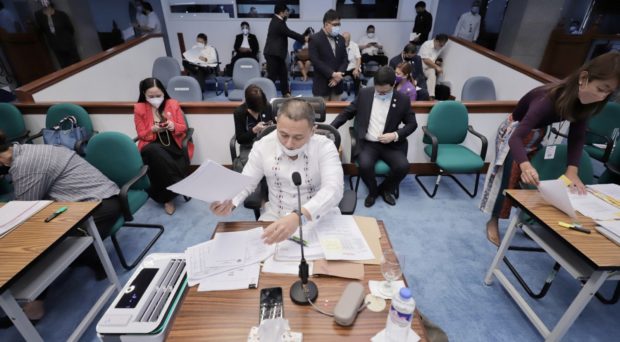
Finance Committee chairperson Sen. Sonny Angara prepares to defend the budget of the Department of Justice on Nov. 17, 2021 during the Senate’s week-long plenary deliberations on the 2022 budget. (Joseph Vidal/Senate PRIB)
MANILA, Philippines — The Senate on Wednesday approved on third and final reading the proposed P5.024 trillion national budget for 2022.
Voting 22-0-0, senators approved House Bill No. 10153 or the 2022 General Appropriations Bill.
Senate finance committee chairman Senator Sonny Angara informed his colleagues of the amendments proposed by senators after plenary debates on the 2022 budget were completed last week.
“May pagbabago man sa mga detalye, ang mahalaga hindi pa rin nagbago ang pinaka adhikain ng ating panukalang budget na magsilbing siyang pangunahing paraan para ipagpatuloy ang pagahon ng bansa mula sa pandemya,” Angara said.
(While there are changes in the details, what’s important is that our objective remains the same, to use the proposed budget as our primary way for our country to recover from the pandemic.)
In light of the looming threat of the Omicron COVID-19 variant, the senator stressed the need to prepare for the “worst-case scenario.”
READ: COVID-19 Omicron variant detected in more countries as scientists race to find answers
“Of course the situation is still developing but needless to say we have to be prepared for the worst-case scenario,” he said.
According to Angara, the health sector will still receive a “significant portion” of the 2022 national budget.
READ: Angara: Health sector 3rd most funded under Senate panel’s version of 2022 budget
The Department of Health (DOH) will receive over P230 billion, “much higher” than the P182 billion it was appropriated under the General Appropriations Bill passed by the House of Representatives, he said.
Apart from this, the Senate ensured the continued provision of COVID-19 benefits for both public and private health workers, Angara added.
Funding was also provided to support the DOH’s emergency hiring of health professionals and for the procurement of laboratory network commodities.
The Senate, Angara said, also increased the budget of the DOH’s Epidemiology and Surveillance Program and for the operations of the national reference laboratories.
The chamber also included funds for the hiring and training of 25,000 contract tracers for next year.
An augmentation of around P3.2 billion to the funding for the DOH’s Health Facilities Enhancement Program is likewise included under the Senate’s final version of the budget, according to the senator.
The Senate also increased the operation budgets for DOH-operated hospitals, P4.363 billion for Metro Manila and P10.724 billion for those in other regions.
“More indigent and financially-incapacitated patients will also receive the assistance they need with the Senate’s interventions in the 2022 budget,” Angara further said.
He noted that funding of up to P24.423 billion will be allocated as assistance to such patients across the country.
Angara also said an amendment was made to the special provisions under the budget that would ensure funding for the purchase and allocation of drugs, medicines, and vaccines as well as drugs and medicine approved by the Food and Drug Administration for the treatment of COVID-19.
For education, Angara said increases were provided in the budgets of the Department of Education (DepEd), state universities and colleges, and the Technical Education and Skills Development Authority to aid the implementation of more face-to-face classes in schools.
A special provision was introduced to allow the use of appropriations under their Maintenance and Other Operating Expenses (MOOE) to help schools adjust to the needs of face-to-face classes, Angara said.
Funding under the MOOE may be used for improvements or modifications in classrooms, laboratories, and other spaces for proper ventilation; to procure COVID-19 tests for faculty and staff, and other necessary supplies, equipment and tools to ensure compliance with existing safety protocols and standards; to rehabilitate water and sanitation facilities; and undergo any other changes to maintain respiratory and hand hygiene within the school premises, according to Angara.
“Support will also continue for our embattled teachers in the form of extra cash allowances, including the teaching supplies allowance or chalk allowance,” he added.
Increases were likewise provided in the budgets of the DepEd’s Last Mile Schools Program and for electrification of unenergized schools and modernization of electrical systems of on-grid schools.
Meanwhile, the Tulong Trabaho Fund was also augmented by the Senate so that “more of our workforce will be equipped with the necessary skills to meet the challenges of rapidly evolving workplaces and work structures,” Angara added.